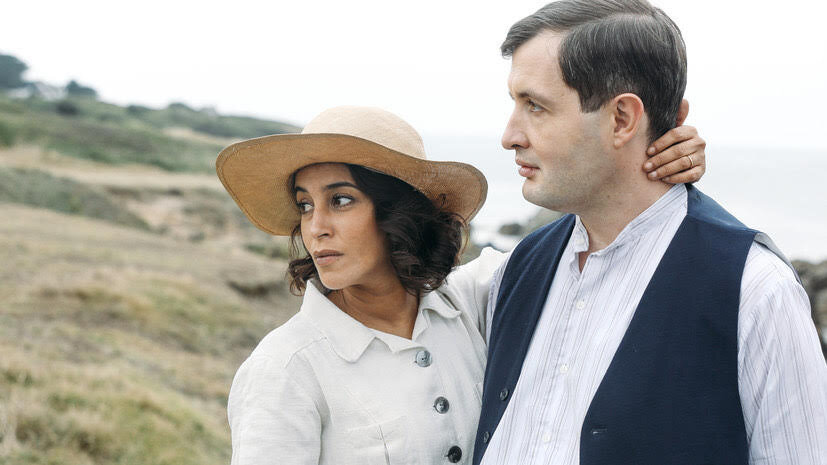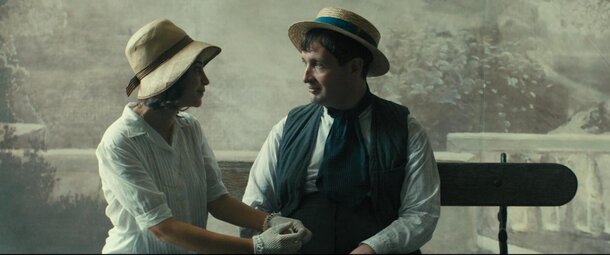«Loving Memories» - Movie Review by Kinoafisha

To love is to live.
"C'est mon homme" is hitting theaters - the debut film by director Guillaume Bureau, first presented at the Francophone Film Festival in Angoulême in 2022. This Franco-Belgian intimate drama by the emerging filmmaker is based on real events that took place in Italy in the 1920s. At that time, a court tried to establish the identity of a soldier with amnesia, whom his wife recognized, but in the end, he turned out to be a completely different person. There were thousands of such stories after the First World War. At the same time, in France, several families claimed one surviving soldier who had lost his memory. In his film, Guillaume Bureau tried to convey the defensive reaction of people affected by war to unbearable grief: many of them denied that they had lost their loved ones and found solace in recognizing their husbands, fathers, brothers, and sons in completely different men. The director has made a heart-wrenching movie about a person's attempt to recreate an illusory world in which all their loved ones are alive, in order to drown out the unbearable loneliness and not lose their mind.
Guillaume Bureau tells the story of a girl named Julie Delon, who works in a photo studio in a small town somewhere in Burgundy. Her husband Julien (Karim Leklou) went missing on the front lines, and there has been no news from him for a long time. The spouse's brother tries to convince Julie that her beloved has perished. However, she cannot accept the loss and continues to live in hope that her husband will definitely return. And then, three years after the end of the First World War, a newspaper writes about an unknown soldier with amnesia, who was found aimlessly wandering around a train station and taken to a hospital. Seeing the accompanying photo in the article, Julie recognizes her spouse in the man and rushes to the place where he is, to bring him home. However, it turns out that she is not the only one who saw a loved one in the soldier - several desperate families respond to the advertisement in the newspaper. Nevertheless, doctors confirm the special mark that Julie mentioned and allow her to take the bewildered Julien home. It seems that the lives of the spouses should gradually return to normal. However, some time later, another woman appears, claiming that Julien's real name is Victor Brunet and he is her lover.

In the melancholic and tragic picture by Guillaume Bureau, depicting the shattered fates of people, there is something reminiscent of Remarque's works. In "C'est mon homme," the director strives to convey the emotional state of society, which, even in dark times, constructs its fragile world where, even if only for a moment, one can feel happy and immerse themselves in memories of a carefree past. Thus, Julie, touchingly portrayed by Leila Behliti, reenacts scenes from her and Julien's past reality, a time when they loved and knew neither worry nor pain. The heroine, deep down, realizes that the man before her is not her husband, as her brother-in-law insists, and she desperately tries to shield herself from the unbearable burden of loss while living in joyful moments of the past. The girl recreates her first encounter with Julien in a photo studio and their touching date at the cinema, where they watched "Vampires" in 1915 – she even briefly appears in that famous costume of Irma Vep. Julie wants the man to believe in this imagined past and stay with her, but alas, all her hopes gradually fade and ultimately vanish when cabaret dancer Rose-Marie Bruin (Louise Burguan) appears. This luxurious and striking woman is also ready to fight for her rights to Julien, especially considering that she has much more evidence than the main heroine.

Interestingly, with the appearance of the film's second contender, Guillaume Bureau does not deteriorate into a cheap melodrama about a fierce struggle for a man; instead, he maintains his level and confidently continues to develop in a dramatic direction. The viewer is smoothly immersed into Julien's alternative past, where he is called Victor, working as a waiter in a Parisian cabaret and meeting the beautiful Rose-Marie. The director amazingly captures the spirit of the time and subtly draws parallels between the carefree and lively 1910s and the post-war era with its lost generation, who try to find the strength to continue living. "C'est mon homme" is a film primarily focused not on the story of the two couples but on the uncertainty of the future and the impossibility of letting go of the past and moving forward, because it is too dear to your heart. Guillaume Bureau's creation, woven from fragments of memories of sunny and romantic days "before," is a philosophical contemplation with the message of carpe diem ("seize the moment"), for tomorrow everything can change once and forever.

"C'est mon homme" is deliberately filmed with a slightly old-fashioned style and its atmosphere resembles a vintage postcard with picturesque landscapes of Burgundy and the Pays de la Loire region. The creators of the film pay special attention to the costumes of the heroines, which reflect not only the fashion of the era but also the emotional state of the women. Julie, living in the past, dresses in a somewhat outdated manner, while Rose-Marie, on the contrary, follows the trends of the roaring 1920s, capturing the rhythm of the time and already making plans for the future. We learn closer to the finale that this strong heroine indeed knows how to let go.

"C'est mon homme" is a beautiful and minimalist film with a restrained intrigue that truly reminds one of resurrected old photographs. Guillaume Bureau delicately speaks about the fates of lovers who met at an inconvenient time, yet their stories held so much light and warmth that it will forever remain in the memory box and warm us on the hardest days. And this immortal light of love is conveyed to the audience as well.
